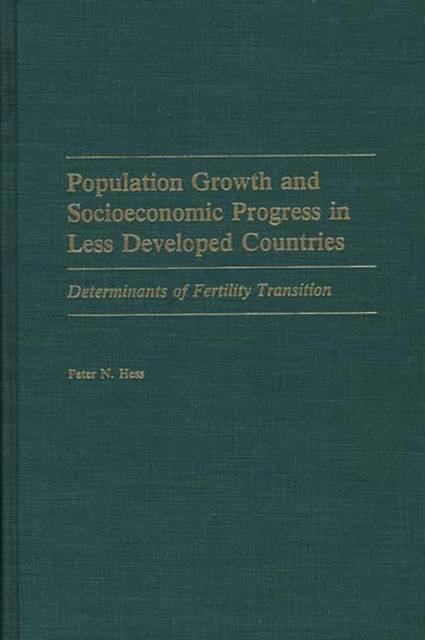
- Afhalen na 1 uur in een winkel met voorraad
- Gratis thuislevering in België vanaf € 30
- Ruim aanbod met 7 miljoen producten
- Afhalen na 1 uur in een winkel met voorraad
- Gratis thuislevering in België vanaf € 30
- Ruim aanbod met 7 miljoen producten
Zoeken
Population Growth and Socioeconomic Progress in Less Developed Countries
Determinants of Fertility Transition
Peter Hess
Hardcover | Engels
€ 161,45
+ 322 punten
Omschrijving
This timely study examines fertility rates and their trends and determinants in less-developed countries by testing an empirical, interdisciplinary model of the fertility transition. In light of the current official position of the United States on population and development, the policy implications of the study are timely. According to some experts, interrupting the spiral of rapid growth and attendant economic and ecological deterioration now rivals nuclear disarmament in importance on the international agenda. Among the questions investigated include: Are there identifiable traits for developing nations that have reduced fertility? Has development become the best contraceptive? Have some development strategies been more conducive to lowering fertility? Do family planning programs have significant impacts on fertility?
Specificaties
Betrokkenen
- Auteur(s):
- Uitgeverij:
Inhoud
- Aantal bladzijden:
- 184
- Taal:
- Engels
Eigenschappen
- Productcode (EAN):
- 9780275929794
- Verschijningsdatum:
- 6/10/1988
- Uitvoering:
- Hardcover
- Formaat:
- Genaaid
- Afmetingen:
- 160 mm x 243 mm
- Gewicht:
- 458 g

Alleen bij Standaard Boekhandel
+ 322 punten op je klantenkaart van Standaard Boekhandel
Beoordelingen
We publiceren alleen reviews die voldoen aan de voorwaarden voor reviews. Bekijk onze voorwaarden voor reviews.











